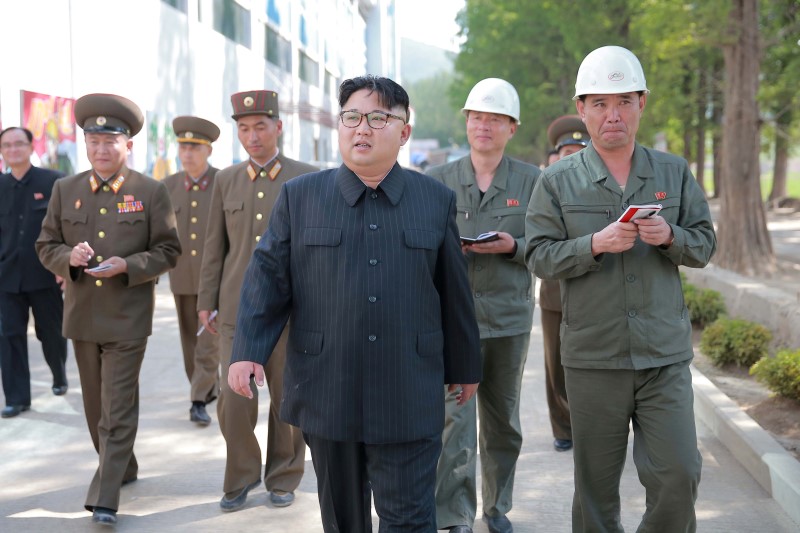By Jonathan Landay, David Brunnstrom and Matt Spetalnick
WASHINGTON (Reuters) - North Korea has restarted production of plutonium fuel, a senior U.S. State Department official said on Tuesday, showing that it plans to pursue its nuclear weapons program in defiance of international sanctions.
The U.S. assessment came a day after the U.N. nuclear watchdog said it had "indications" that Pyongyang has reactivated a plant to recover plutonium from spent reactor fuel at Yongbyon, its main nuclear complex.
The latest developments suggest North Korea's reclusive regime is working to ensure a steady supply of materials for its drive to build warheads, despite tightened international sanctions after its fourth nuclear test in January.
The U.S. official, who spoke on condition of anonymity, said that Washington is worried by the new plutonium reprocessing effort, but he offered no explicit word on any U.S. response.
"Everything in North Korea is a cause for concern," the official told Reuters.
"They take the spent fuel from the 5 megawatt reactor at Yongbyon and let it cool and then take it to the reprocessing facility, and that's where they've obtained the plutonium for their previous nuclear tests. So they are repeating that process," the official said. "That's what they're doing."
North Korea, which conducted its fourth nuclear test in January, vowed in 2013 to restart all nuclear facilities, including the main reactor and the smaller plant at Yongbyon, which was shut down in 2007 as part of an international disarmament-for-aid deal that later collapsed.
The International Atomic Energy Agency (IAEA), which has no access to North Korea and mainly monitors its activities by satellite, said last year it had seen signs of a resumption of activity at Yongbyon.
IAEA chief Yukiya Amano told a news conference in Vienna on Monday that there have been indications of renewed plutonium reprocessing activities at Yongbyon. Reprocessing involves extracting plutonium from spent reactor fuel, one route to obtaining bomb fuel other than uranium enrichment.
"I would agree that there are indications," the U.S. official said.
The official declined to confirm whether this determination was made from satellite imagery or intelligence sources, or to say how much plutonium North Korea could produce by this method.
South Korea's Unification Ministry spokesman Cheong Joon-hee said Seoul was closely watching movements related to the North's nuclear facility "with grave concern" but declined to comment directly on plutonium production.
A spokesman for China's Foreign Ministry said China, North Korea's lone major ally, has always promoted the denuclearization of the Korean peninsula and a resolution of the issue via talks.
"We hope all parties can work hard together to put the nuclear issue back on the track of dialogue and negotiations," spokesman Hong Lei told reporters.
SHROUDED IN SECRECY
North Korea announced at a rare congress of its ruling Workers' Party last month that it would strengthen its defensive nuclear weapons capability.
It had already declared itself "a responsible nuclear weapons state" and disavowed the use of nuclear weapons unless its sovereignty is first infringed by others with nuclear arms.
While North Korea in the past has often obtained key components for its nuclear program from other countries despite international sanctions, there was no sign of any recent outside procurement involved in reactivating its plutonium reprocessing, the U.S. official said.
There is little proven knowledge about the quantities of weapons-grade uranium or plutonium that North Korea possesses, or its ability to produce either, though plutonium from spent fuel at Yongbyon is widely believed to have been used in its nuclear bombs.
South Korean Defense Minister Han Min-koo said last month the North probably had about 40 kg (88 lb) of plutonium. That would be enough to make eight to 10 bombs, according to experts.
Operating the 5 megawatt reactor could yield about 5-6 kg of plutonium a year, they said.
Experts at the U.S.-Korea Institute at Johns Hopkins University's School of Advanced International Studies in Washington predicted last year that North Korea's nuclear weapons stockpile could grow to 20, 50 or 100 bombs within five years, from an estimated 10 to 16 weapons at that time.
North Korea has come under tightening international pressure over its nuclear weapons program, including tougher U.N. sanctions adopted in March backed by China, following its most recent nuclear blast and ballistic missile tests.
The website 38 North reported last week, based on commercial satellite imagery, that exhaust plumes had been detected twice in May from the thermal plant at Yongbyon's Radiochemical Laboratory, the site's main reprocessing installation.

The Institute for Science and International Security also reported exhaust emissions from a chimney at the plant, which it said was often associated with reprocessing activities there.
